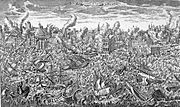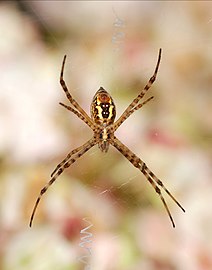Portal:Portugal
  Portugal, officially the Portuguese Republic, is a country located on the Iberian Peninsula in Southwestern Europe, whose territory also includes the Macaronesian archipelagos of the Azores and Madeira. It features the westernmost point in continental Europe; its mainland west and south border with the North Atlantic Ocean; and in the north and east, the Portugal-Spain border, which constitutes the longest uninterrupted border line in the European Union. Portugal is the oldest nation-state in Europe. Founded in 1143, its current borders were established in mid-13th century, making them some of the most ancient in Europe and the world. Its archipelagos form two autonomous regions with their own regional governments. On the mainland, the Alentejo region occupies the biggest area but is one of the least densely populated regions of Europe. Lisbon is the capital and largest city by population, and it is also the main spot for tourists alongside Porto, the Algarve and Madeira. As one of the oldest countries in Europe, its territory has been continuously settled and fought over since prehistoric times. The territory was inhabited by the Celtic and Iberian peoples. It was later ruled by the Romans, followed by the invasions of Germanic peoples together with the Alans and later the Moors, who were eventually expelled during the Reconquista. First founded as a county within the Kingdom of León in 868, Portugal formally became an independent kingdom with the Treaty of Zamora in 1143. During the Age of Discovery, particularly in the 15th and 16th centuries, Portugal established one of the longest-lived maritime and commercial empires, becoming one of the main economic and political powers of the time. By the early 19th century, events such as the 1755 Lisbon earthquake, the country's occupation during the Napoleonic Wars, and the resulting independence of Brazil in 1822 led to a marked decay of Portugal's prior opulence. This was followed by the civil war between liberal constitutionalists and conservative absolutists over royal succession from 1828 to 1834. The 1910 revolution deposed Portugal's monarchy and established the democratic but unstable Portuguese First Republic, later superseded by the authoritarian regimes of Ditadura Nacional (National Dictatorship) and Estado Novo (New State). Democracy was restored after the Carnation Revolution (1974), ending the Portuguese Colonial War and eventually losing its remaining colonial possessions. (Full article...)  Madeira (/məˈdɪərə/ mə-DEER-ə or /məˈdɛərə/ mə-DAIR-ə; European Portuguese: [mɐˈðɐjɾɐ] ), officially the Autonomous Region of Madeira (Portuguese: Região Autónoma da Madeira), is an autonomous region of Portugal. It is an archipelago situated in the North Atlantic Ocean, in the region of Macaronesia, just under 400 kilometres (250 mi) north of the Canary Islands, 520 kilometres (320 mi) west of the Kingdom of Morocco and 805 kilometres (500 mi) southwest of mainland Portugal. Madeira sits on the African Tectonic Plate, although it is culturally, politically and ethnically associated with Europe, with its population predominantly descended from Portuguese settlers. Its population was 251,060 in 2021. The capital of Madeira is Funchal, on the main island's south coast. The archipelago includes the islands of Madeira, Porto Santo, and the Desertas, administered together with the separate archipelago of the Savage Islands. Roughly half of the population lives in Funchal. The region has political and administrative autonomy through the Administrative Political Statute of the Autonomous Region of Madeira provided for in the Portuguese Constitution. The region is an integral part of the European Union as an outermost region. Madeira generally has a mild/moderate subtropical climate with mediterranean summer droughts and winter rain. Many microclimates are found at different elevations. (Full article...)This is a Featured article, which represents some of the best content on English Wikipedia.
The Madeira firecrest, Madeira kinglet, or Madeiracrest (Regulus madeirensis) is a very small passerine bird endemic to the island of Madeira. It is a member of the kinglet family. Before it was recognised as a separate species in 2003, it was classified as a subspecies of the common firecrest. It differs in appearance and vocalisations from its relative, and genetic analysis has confirmed it as a different species. The Madeiran bird has green upperparts, whitish underparts and two white wingbars, and a distinctive head pattern with a black eye stripe, short white supercilium, and a crest that is mainly orange in the male and yellow in the female. The female Madeira firecrest builds a spherical nest from cobwebs, moss and small twigs, and she incubates the eggs and broods the chicks on her own. Both parents feed the young. This species forages for insects and other small invertebrates in tree heath, laurisilva and other woodland. It is common within its restricted range, and is not considered to be threatened. (Full article...)The following are images from various Portugal-related articles on Wikipedia.
"Help! They are killing the Master!"
Matam o Mestre! Matam o Mestre nos paços da Rainha! Acudi ao Mestre que o matam!” Álvaro Pais, conspirator during the 1383-1385 crisis, before the Grand Master of the Order of Aviz (future John I of Portugal) killed the Count of Andeiro This is a Good article, an article that meets a core set of high editorial standards.
 Caldas da Rainha (European Portuguese: [ˈkaldɐʒ ðɐ ʁɐˈiɲɐ] ) is a medium-sized Portuguese city in the Oeste region, in the historical province of Estremadura, and in the district of Leiria. The city serves as the seat of the larger municipality of the same name and of the Comunidade Intermunicipal do Oeste (OesteCIM, Intermunicipal Community of the West). At the 2011 census, the municipality had a population of 51,729 in an area of 255.69 square kilometres (98.72 sq mi), with 30,343 residing in the city. Although the city itself lies about 10.5 kilometres (6.5 mi) inland, three of the municipality's civil parishes lie on the Atlantic Ocean. Caldas da Rainha is best known for its sulphurous hot springs and ceramic pottery. The settlement was founded in the 15th century by Queen Leonor (Rainha Dona Leonor), who established a hospital and a church at the site of some therapeutic hot springs. The Hospital Termal Rainha D. Leonor (Queen Leonor Spring Water Hospital, or Thermal Hospital) is the oldest purpose-built institution of its kind in the world, with five centuries of history. The city's name, often shortened to simply "Caldas", can be translated as "Queen's Hot Springs", "Queen's Spa", or "Queen's Baths". (Full article...)Manuel I (European Portuguese: [mɐnuˈɛl]; 31 May 1469 – 13 December 1521), known as the Fortunate (Portuguese: O Venturoso), was King of Portugal from 1495 to 1521. A member of the House of Aviz, Manuel was Duke of Beja and Viseu prior to succeeding his cousin, John II of Portugal, as monarch. Manuel ruled over a period of intensive expansion of the Portuguese Empire owing to the numerous Portuguese discoveries made during his reign. His sponsorship of Vasco da Gama led to the Portuguese discovery of the sea route to India in 1498, resulting in the creation of the Portuguese India Armadas, which guaranteed Portugal's monopoly on the spice trade. Manuel began the Portuguese colonization of the Americas and Portuguese India, and oversaw the establishment of a vast trade empire across Africa and Asia. Manuel established the Casa da Índia, a royal institution that managed Portugal's monopolies and its imperial expansion. He financed numerous famed Portuguese navigators, including Pedro Álvares Cabral (who discovered Brazil), Afonso de Albuquerque (who established Portuguese hegemony in the Indian Ocean), among numerous others. The income from Portuguese trade monopolies and colonized lands made Manuel the wealthiest monarch in Europe, allowing him to be one of the great patrons of the Portuguese Renaissance, which produced many significant artistic and literary achievements. Manuel patronized numerous Portuguese intellectuals, including playwright Gil Vicente (called the father of Portuguese and Spanish theatre). The Manueline style, considered Portugal's national architecture, is named for the king. (Full article...) A Portuguese F-84 being loaded with amunition in the 60's, at the Luanda Air Base, during the Portuguese Colonial War
Featured articlesFormer featured articlesFeatured listsFormer featured listsGood articles
Former good articlesDid you know? articles
Featured pictures
Former featured portalsIn the News articles
Main page featured articles
Picture of the day pictures
Featured topicsThis list was generated from these rules. Questions and feedback are always welcome! The search is being run daily with the most recent ~14 days of results. Note: Some articles may not be relevant to this project.
Rules | Match log | Results page (for watching) | Last updated: 2024-09-16 22:15 (UTC) Note: The list display can now be customized by each user. See List display personalization for details.
The following Wikimedia Foundation sister projects provide more on this subject:
Discover Wikipedia using portals |




























![Image 28Maios celebration in Madeira island [1] (from Culture of Portugal)](http://upload.wikimedia.org/wikipedia/commons/thumb/e/e1/2011-03-05_03-13_Madeira_045_Santana_%285543431418%29.jpg/180px-2011-03-05_03-13_Madeira_045_Santana_%285543431418%29.jpg)
















































































